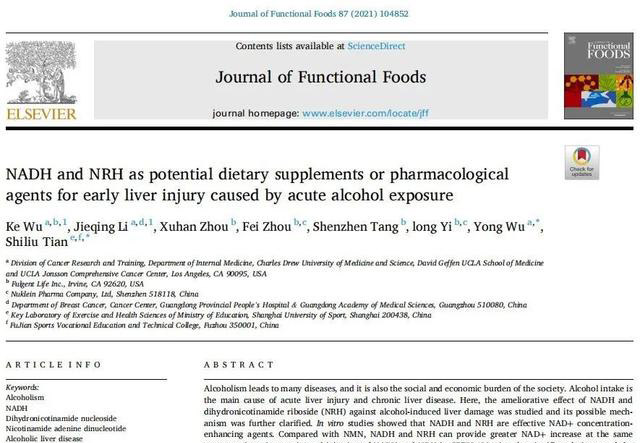NADH: Relieves alcohol and protects the liver
6 min read | 16 Jul. 2023

The Lancet study found that there is no such thing as "safe" alcohol consumption. No matter how low the intake, alcohol is not safe to consume. Harmful drinking has become the leading cause of advanced liver disease and liver-related hospitalizations and deaths worldwide, with alcohol accounting for 50% of all liver disease deaths.
Data statistics:
More than 43.6% of cirrhosis deaths in the United States are alcohol-related.
In Italy, alcohol abuse accounted for 46.5% of liver dysfunction;
In Sweden, the incidence of liver disease is proportional to the increase in alcohol sales, especially among men;
In Norway, alcohol is the main cause of cirrhosis in 53% of cases;
In Japan, about two-thirds of alcoholic liver diseases are caused by drinking alcohol alone...
According to the data released by the World Health Organization, the alcohol consumption per capita of the drinking people in our country has exceeded the "alcoholic people" in other traditional alcohol consuming countries, such as Ireland, Australia, the United States, etc. At present, the proportion of drinking population and the prevalence of alcoholic liver disease in China are increasing every year. It is estimated that the prevalence of alcoholic liver disease in the general population in China is at least 15%-20%, and alcoholic liver disease has become one of the most important chronic liver diseases in China. At the same time, more than 30% of people in China have liver problems, becoming the world's largest burden of liver disease.
Research shows that:
In November 2021, a blockbuster study published in the Journal of Functional Foods, a top international academic journal, showed that NADH can be used as a potential dietary supplement or drug for early liver damage caused by acute alcohol exposure.
Gavage of 500 mg/kg of NADH in mice 15 minutes before acute alcohol intake (8 ml/kg, 40% w/v) significantly enhanced alcohol metabolism, manifested by reduced concentrations of ethanol and acetaldehyde in the blood, and reduced duration of loss of righting reflex (LORR). Both pretreatment and post-treatment of NADH can significantly reduce the increase of serum aspartate aminotransferase (AST) and alanine aminotransferase (ALT) after alcohol treatment, indicating that NADH has a certain therapeutic effect on alcohol hepatotoxicity in addition to preventing alcohol-induced adverse reactions. In addition, NADH may reduce abnormal lipid metabolism in acute alcoholic liver injury.

Several studies in the United States and Germany have also found that NADH is an effective antioxidant that directly acts on two key enzymes in alcohol metabolism: acetaldehyde dehydrogenase and ethanol dehydrogenase, preventing alcohol accumulation in the liver and promoting acetaldehyde conversion to acetic acid. Therefore, supplementing NADH helps to improve alcohol metabolism and reduce the damage of alcohol to the liver.
NADH, also known as mitochondriin, is present in the mitochondria of all animal and plant cells. The nature of NADH is extremely delicate, oxygen, humidity, light, acidic pH are easy to make NADH inactive. Vegetables almost do not contain NADH, meat contains only a small amount of NADH, food can be obtained by the human body after cooking almost lost, so it is extremely difficult to rely on daily food to ingest NADH, exogenous supplement NADH is particularly important.
In recent years, the use of synthetic biology to produce NADH has attracted more and more attention. Synthetic biotechnology has been hailed as one of the key technologies that will change the future of mankind.